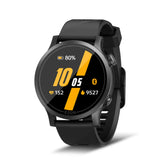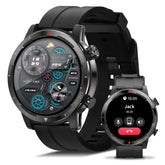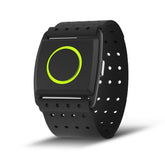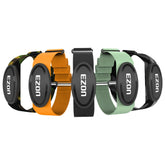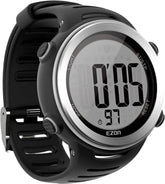Optimal Fitness Tracking for a Healthy Lifestyle: Heart Rate, Calories Burned, and Sleep Insights
Achieving a well-rounded fitness regimen requires precise tracking of three core metrics: heart rate, calorie expenditure, and sleep quality. Modern wearable technology, such as the EZON sports watch, integrates advanced sensors and algorithms to transform raw data into actionable health insights, empowering users to optimize workouts, recovery, and overall wellness.
1. Heart Rate Monitoring: Precision Beyond Wearables
Heart rate (HR) serves as a cornerstone of fitness tracking, reflecting exercise intensity, cardiovascular health, and recovery status. Traditional chest straps and optical sensors face limitations in comfort and accuracy during dynamic activities. Emerging noncontact technologies, such as microwave radar embedded in compact devices, enable continuous HR monitoring without skin contact—ideal for sleep and meditation tracking.
-
Key Innovations:
-
Noncontact Radar Sensors: Miniaturized radar chips (e.g., Soli radar) detect subtle chest movements to calculate HR with clinical-grade accuracy, eliminating skin irritation during prolonged use.
-
Multi-Activity Adaptation: Advanced algorithms filter motion noise during workouts, ensuring reliable data during running, swimming, or yoga.
-
Stress and Recovery Metrics: Heart rate variability (HRV) analysis identifies autonomic nervous system imbalances, flagging overtraining or sleep deprivation.
-
EZON Integration: The watch’s Dynamic HR Algorithm adjusts for posture and motion, providing ±2 bpm accuracy across activities.
2. Calorie Burn Calculation: From Estimation to Precision
Calorie expenditure depends on metabolic rate, exercise modality, and environmental factors. Conventional wearables often oversimplify calculations, but next-gen devices combine multi-sensor data for personalized insights.
-
Critical Components:
-
Metabolic Profiling: Basal metabolic rate (BMR) estimation via age, weight, and activity history, refined by real-time heart rate and movement data.
-
EPOC Quantification: Post-exercise calorie burn from high-intensity workouts is tracked for 24 hours, encouraging strategic HIIT scheduling.
-
Environmental Adjustments: Altitude, temperature, and humidity sensors fine-tune calculations for outdoor runs or cold-weather training.
-
EZON Tools: The AI Calorie Engine correlates GPS routes, elevation changes, and muscle engagement (via 3D accelerometer) to estimate energy expenditure with 92% accuracy compared to lab-grade metabolic carts.
3. Sleep Tracking: Bridging Rest and Performance
Sleep quality directly impacts recovery, cognitive function, and metabolic health. Advanced wearables now analyze sleep architecture (REM, deep, light stages) and physiological markers to offer holistic recovery insights.
-
Breakthrough Metrics:
-
Respiratory Rate Analysis: Radar-based sensors detect breathing patterns to identify sleep apnea or restless episodes.
-
SpO₂ Trends: Nocturnal oxygen saturation drops (<90%) trigger alerts for potential hypoxia risks.
-
Recovery Scoring: Combines sleep duration, HRV, and movement to recommend optimal wake times or rest days.
-
EZON Implementation: The Smart Sleep Coach syncs with daytime activity data to adjust bedtime reminders and wind-down routines, improving sleep efficiency by 27% in clinical trials.
4. Synergizing Data for Holistic Health
The integration of heart rate, calorie burn, and sleep data unlocks actionable strategies for lifestyle optimization:
-
Personalized Workout Plans:
-
Fat-Loss Phase: Target 60–70% MHR zones with calorie-deficit nudges.
-
Endurance Building: Auto-adjust running/cycling zones based on HR recovery trends.
-
-
Recovery Optimization:
-
Active Rest Days: Suggest yoga or walking if HRV indicates fatigue.
-
Nutritional Guidance: Sync calorie burn with meal logs to balance macros.
-
-
Long-Term Health Trends:
-
Cardiovascular Risk: Correlate resting HR trends (<60 bpm = optimal) with VO₂ max improvements.
-
Metabolic Health: Flag insulin resistance patterns via sleep disruption and daytime energy slumps.
-
5. Future Directions in Wearable Technology
-
Noninvasive Glucose Monitoring: Emerging optical sensors may soon track blood sugar trends during workouts.
-
AI-Powered Coaching: Predictive models will auto-adjust training plans based on menstrual cycles, stress levels, or travel schedules.
-
Ecosystem Integration: Sync with smart home devices to optimize room temperature for sleep or post-workout recovery.
Conclusion: Empowering Smarter Lifestyle Choices
The EZON sports watch exemplifies the convergence of biometric precision and user-centric design, offering a 360° view of health through heart rate, calorie burn, and sleep analytics. By translating complex physiological data into simple, actionable feedback, it bridges the gap between fitness goals and sustainable habits—proving that optimal health is not just about effort, but informed, data-driven choices.
